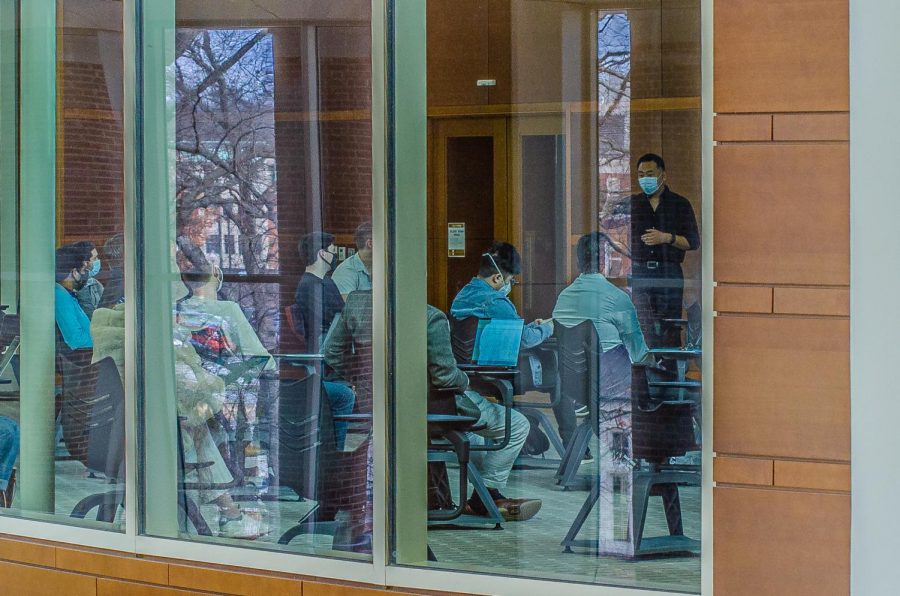How the pandemic is affecting mental health
During a pandemic, students reflect on the state of their mental health journey on campus
Students note that this year’s on-campus COVID-19 restrictions are causing strains on both their mental health and social life.
March 11, 2021
For junior Ashwin Singh, a pre-pandemic year spent studying abroad at Oxford University quickly turned into play dates with his golden retrievers back home in West Chester, Pa. He was then forced into isolation with his roommate per Orange status restrictions during the first few months of the new spring semester.
However, like many other students, he was grateful to have this opportunity to be on campus, even if it meant adapting to a completely different mode of social interaction for the semester.
“I underestimated how fun it is to be on campus,” Singh said. “But it is not without mental health struggles.”
Life also became incredibly mundane for junior Suchi Jain, whose mental health took a hit due to limited opportunities for social interactions.
“My roommate and I started a habit of listing one thing we were looking forward to the following day,” Jain said. “But most of the time, it was nothing except for food.”
A recent report by the Center for Collegiate Mental Health analyzed data from 47,797 students and concluded that COVID-19 had varying impacts on mental health. While only 33% of student responders indicated that COVID-19 was the reason for seeking mental health services, 85% said that the pandemic negatively affected at least one aspect of their lives, including mental health, motivation, loneliness, academics and missed experiences.
At Wake Forest, the percentage of students seeking counseling has remained consistent (15-16%) even with the pandemic restrictions. However, according to the Wake Forest counseling center’s interim director, Daniel M. Paredes, more students are seeking crisis services.
Paredes said that anxiety is the top-cited issue amongst students experiencing a transition adult life and dealing with the pandemic. Trying to stay safe while also building meaningful relationships remains a social struggle for many students.
His silver lining was that Generation Z recently emphasized real relationships over social media, which he believed was the other way around 20 months ago.
“A ‘like’ is not the same as a hug, and there is nothing you can do about it,” Paredes said.
These conflicts were highlighted by sophomore Dakotah Kuhns, who disliked being cooped up with the same people in a small living space.
“I’ve gotten closer to my inner circle, but I’ve also grown apart from my acquaintances and other friends because I simply couldn’t make plans with them anymore,” Kuhns said.
The recent shutdown of the gym on campus resulted in Kuhns being dismissed from his spin-class instructor job. He became frustrated because of the loss of income, tighter social restrictions and near-constant cold, rainy weather.
Now that campus has returned to normal Orange status, Kuhn is excited to teach spin-classes again with the promise of warmer weather on the horizon.
Wake Forest offers various mental health resources through offices like the Wellbeing Center, Women’s Center, Thrive, and Campus Rec. Some of their initiatives include aromatherapy campaigns, virtual fitness classes, nutrition coaching and a new program called “A Friend in the Forest” which allows students to call in and talk to a grad student working in clinical psychology about their daily experiences.
Despite all their struggles, more students appear to be finding their own ray of light. Freshman Alyse Harris, finds joy working at the Thrive office where she assists with mental health programming. She has also made new friends in college through social media and has enjoyed getting lunch with them.
“My friend group has made it a routine to eat at least one meal together every day,” Harris said. “This consistency has helped us check in with each other.”
As COVID-19 cases decrease on campus and the weather becomes warmer, counselors are hopeful that students can feel more at ease during the remainder of the semester. Peer support is also expected to grow because of shared experiences. The only way to regrow the Wake Forest community is together.
“The Wake Forest community needs to get better at asking, ‘How are you really doing?’ and actually mean it,” Paredes says.














